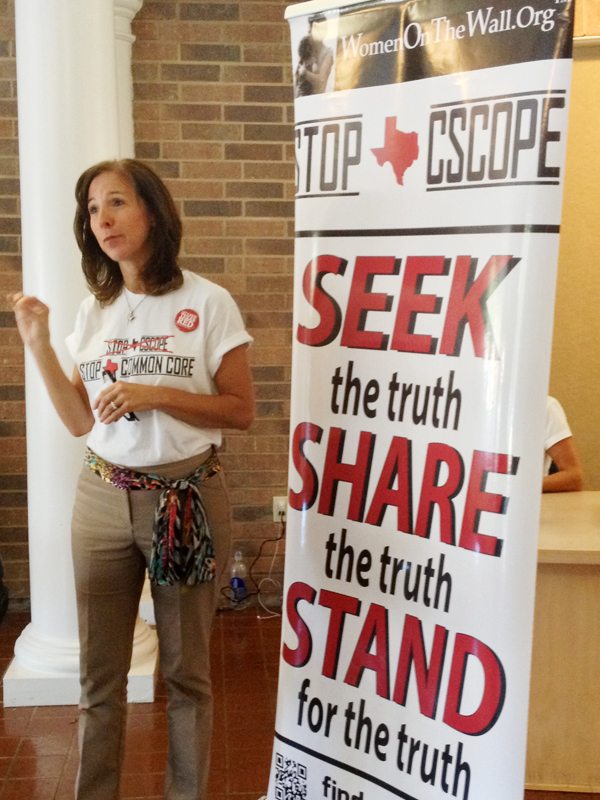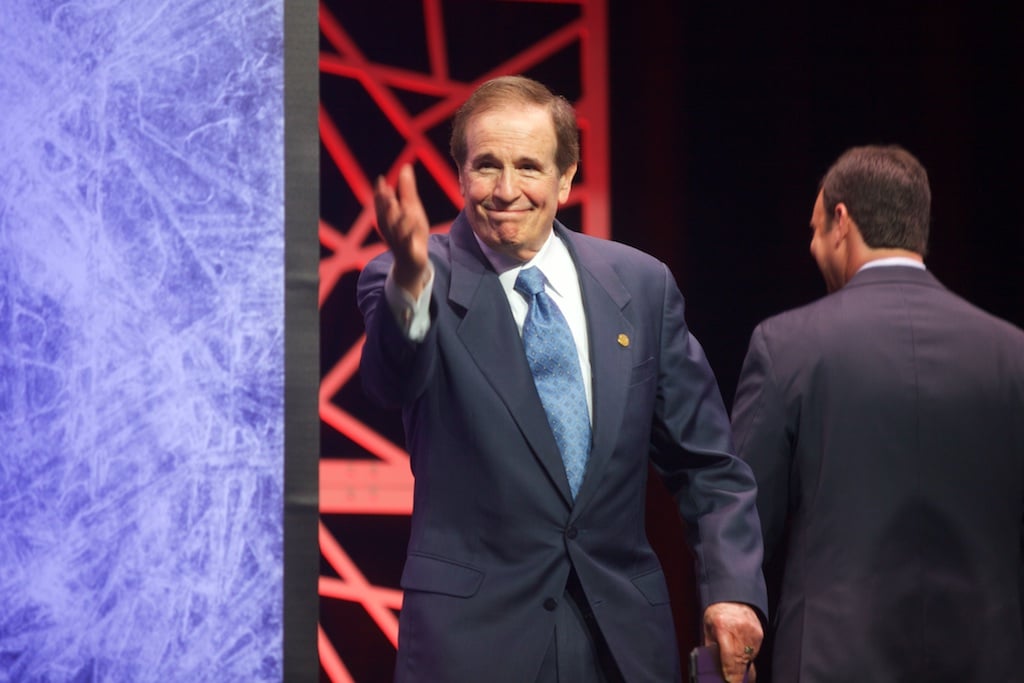
Next Frontier in Common Core Fight: Cut Budgets, Jail Teachers?

Above: CSCOPE critic Alice Linahan.
Can you think of a single more pernicious and insidious organization in American life than the National Parent Teacher Association? If you can, it’s probably a good thing you missed the “#CANiSEE the Solution” conference in Austin this weekend.
The PTA’s national convention—a gathering of the evil empire—was just a block away. In a Marriott meeting room, a small group of activists, convened by conservative activists and supported by groups like the Heritage Foundation and Phyllis Schlafly’s Eagle Forum, gathered to remind each other and the world about their core message: They really, really, really do not like the Common Core State Standards Initiative.
If you haven’t heard much about Common Core, that might be because it’s never been implemented in Texas. In fact, it’s against state law to implement it.
But don’t try telling the concerned parents and grandparents who gathered at the Marriott for two full days of meetings and panels on the subject. For them, the Common Core is just one part of a larger problem. Barack Obama’s federal education shock troops are coming for Texas children. And there’s pretty much nothing anyone can do to reassure them that it’s going to be OK.
Admittedly, there were only a few dozen at the conference, despite the high-profile sponsors. The $250 cost of taking part in the summit might have had something to do with that. But those who came were the hardest of the hardcore—like the woman who exhorted state Rep. Bill Zedler (R-Arlington) to jail school administrators who tried to implement any part of federal education reforms. Zedler and Cathie Adams, the leader of the Texas branch of the Eagle Forum, found themselves in the surprising position of being the relative moderates in the conference. They stopped short of calling for jail terms for principals, but called for legislation that would force school districts to “choose” between state and federal funds—a fringe idea that could nonetheless do significant damage if it gains traction during the legislative session that begins in January.
Common Core, an attempt to align curricula and standards across state lines, originated with the states themselves; the original standards were drawn up at the behest of the National Governors Association, a bipartisan group, and the Council of Chief State Schools Officers, a group of public school officials from the 50 states. But it’s become tied to some of the Obama administration’s education reform efforts, which, for a certain group of people, is like saying it’s the pet project of the Antichrist. The anger about Common Core has merged with even local efforts at aligning curricula between school districts here in Texas—that’s CSCOPE, now watered down and renamed. For the people at this weekend’s conference, Common Core and CSCOPE are one and the same.
But the passionate intensity summoned by attendees is about something bigger than curricula; the way we order classrooms says a lot about how we aim to order society. In the latter case, these people have been on the losing end for some time. And that makes the fight over the classroom all the more important.
One document issued to attendees seeks to outline the differences between “Traditional” education and “CSCOPE & Common Core” methods. The first method favors “direct instruction by teacher,” while the latter favors “self-directed learning” aimed to advance a “progressive, radical social justice agenda,” and encompasses such evils as “evolution, sexual freedom,” “global warming and climate change,” “diversity,” and the “acceptance of homosexuality as normal.”
Instead of an “authority figure,” students are given a “facilitator.” Instead of math education that emphasizes the rote memorization of algorithms and processes, the new curricula try to make children comfortable with numbers on a conceptual level. Instead of a “focus on American heritage and exceptionalism,” students are taught to develop critical thinking skills that comprise “multiculturalism” and “moral relativism.” In short, the Common Core—as these folks see it—undermines a hierarchical, homogenous worldview that was once prevalent and is now on the decline. The classroom is the place for the last stand.
On the first day of the conference, U.S. Secretary of Education Arne Duncan spoke at the PTA convention across the street. A rebuttal was necessary. The conference’s organizers lined up speakers at an impromptu press conference, including Zedler and Adams. Alice Linahan, a conservative organizer who helped put the conference together, led off with a brief, bland statement from Greg Abbott that irritated some in the crowd. Didn’t he know what was at stake?
Zedler had the unhappy task of representing a state government that some felt hadn’t done enough to fight the feds over education policy.
“We’re gonna work hard to ensure that the schools in Texas don’t have Common Core being used here,” he told the crowd. “We’re going to make sure that [the schools are] going to have a choice. They can either take the federal dollars and Common Core, or they can take the state dollars and what the state plans for the solutions as to how to educate our children.”
It’s hard to tell what that really means. Again, no school in the state has fully adopted Common Core. But some teachers have voluntarily chosen to use Common Core-aligned materials—could they be penalized by the state for that? Would they be prohibited from choosing their own curriculum materials? Could they be forced to forfeit funding?
For some members of the audience, Zedler’s threats reeked of cowardice. “I hear a little bit of compromise up here. My line in the sand has been crossed,” said one woman. “I’m a taxpayer, and I’m a mom.” The Legislature needed to consider jailing those pushing education reforms. “I’m tired of playing around with our kids. Their minds and their bodies are being harmed.”
Zedler kept repeating his plan, but the woman was having none of it. “You use Common Core, you go to jail,” she said. “That’s what we were told last session. How do we get our politicians and our law enforcement to enforce the law?”
Dr. Sandra Stotsky, an anti-Common Core academic from the University of Arkansas, offered an olive branch to the riled crowd. “It wouldn’t be a bad thing, I agree, if one or two of them went to jail,” she said to applause. “That would send a powerful message.”
The sentiment that federal education money should be rejected wholesale, if it comes with preconditions, might seem crazy. But Zedler’s words mirror a provision in the Texas GOP’s 2014 platform. And the idea could take on a life of its own. After all, forcing service providers to choose between state and federal funds is basically how Texas nuked its women’s health care system in 2011.
Afterward, I talked to Adams, a former chairwoman of the state Republican Party. Texas public schools needed to wean themselves off federal money anyway, she said, because the federal government was heading off a cliff. “When we look at what we’re doing with the stock market, when we look at what kind of debt we have, it’s a matter of time that states are going to have to start re-prioritizing anyway.” It was just a question of when.
When I suggested that Texas couldn’t afford to lose any sources of education funding—after years of rocky, unbalanced support from the Legislature and a number of precipitous cuts—Adams disagreed. No one could really say how Texas schools were doing. “It’s like someone can say, well, Texas is 48th out of 50 states in what we spend per student. Well, it depends how many pots of gold you’re looking at and putting into that equation,” she said, suggesting that under different metrics—though she didn’t say which one—Texas had all the public ed money it needed. After the Legislature’s sweeping cuts to public education in 2011 and the state’s failure to reinstate that money in 2013, that seems like “non-traditional” math.

